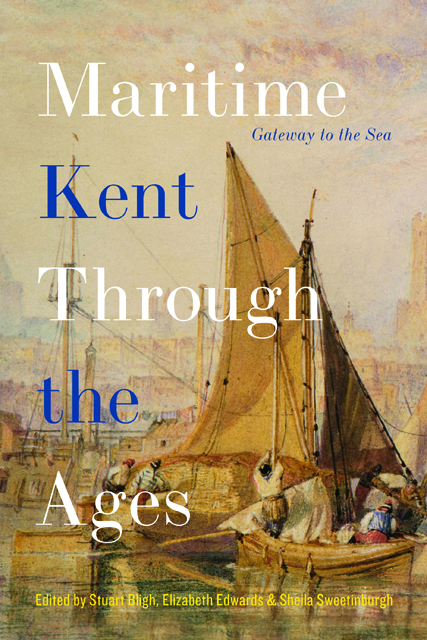9 - Maritime Trade and Industry in Medieval Kent
Published online by Cambridge University Press: 20 December 2023
Summary
Scholarship on the maritime economy of medieval Kent has focused largely on the overseas trade of individual ports, although of late there has been more interest in marine fishing and coastal communities, especially on Romney Marsh. The special privileges and strategic importance of the Cinque Ports have also drawn much attention. Rather less emphasis has been placed on ‘maritime industry’, here defined as collecting and processing resources from the sea or the manufacture and maintenance of the infrastructure needed to facilitate exploitation of the sea’s resources. This chapter summarises the main patterns of overseas trade in Kent and sketches the types and economic impact of such maritime industries as marine fishing, shipbuilding, and harbour works, primarily in the thirteenth to fifteenth centuries. While documentary research takes centre stage, evidence from recent archaeological publications is also crucial in enriching our understanding of maritime trade and industry in medieval Kent.
Maritime Trade
To assess the volume and value of overseas trade in medieval England, scholars turn first to the enrolled customs accounts of the royal exchequer, which record totals by customs jurisdiction for wool exports from 1279 and for other cargoes from the mid-fourteenth century onwards. Calculating any totals for Kent’s overseas trade, however, is hazardous since the county’s ports can appear under five different customs headport jurisdictions. Gravesend and other Kent ports on the Thames, for example, were always included under the totals for London, while the stretch of coast from Gravesend to Sandwich usually appeared under Sandwich, except for periods when Queenborough or Dover were reckoned as headports. Trade through the south Kent ports of Hythe and New Romney could be entered in the Sandwich customs accounts, but in many years they were recorded with Chichester. These record-keeping practices must be taken into consideration in attempts to evaluate trends in the overseas trade of Kent.
The best way to distinguish commercial traffic in individual ports is by consulting the so-called particular customs accounts, which offer detailed accounts of each ship’s cargoes and merchants. But particular accounts have their own problems because their survival is sporadic, they often record only certain types of trade depending on the custom being collected, and the accounts for Kentish ports frequently omit the name and home port of the ship.
- Type
- Chapter
- Information
- Maritime Kent through the AgesGateway to the Sea, pp. 215 - 234Publisher: Boydell & BrewerPrint publication year: 2021



